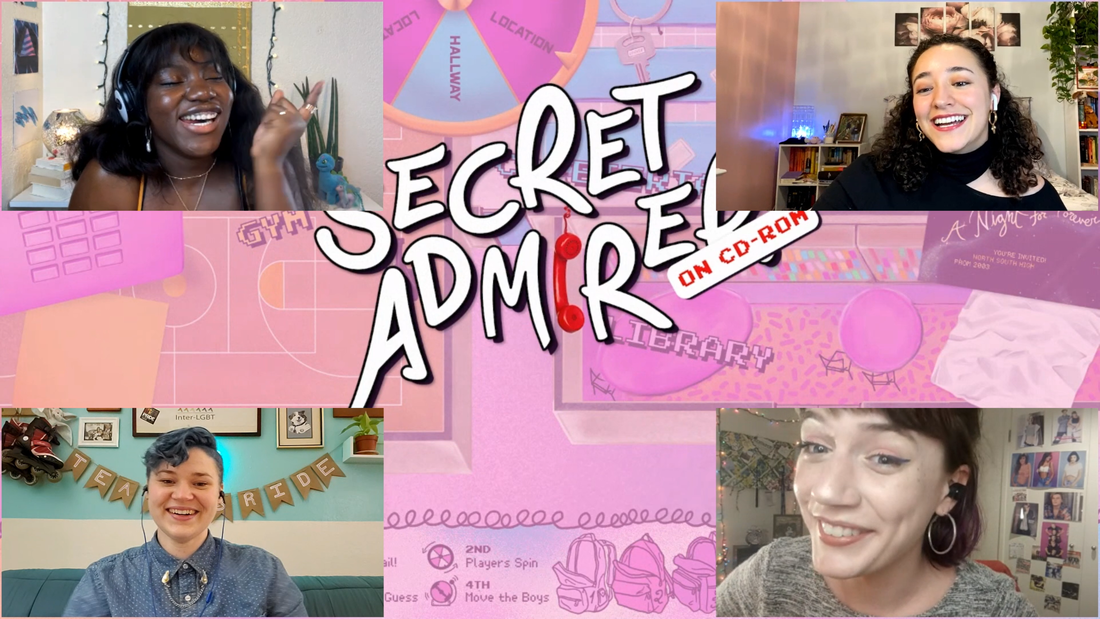‘Secret Admirer ’ Is Indulgent and Uplifting ’90s Nostalgia (Review)
Seattle’s Dacha Theatre goes retro on multiple platforms


Maya shifts uncomfortably in her chair as Autumn enters the chat room. There’s an authentic stilted awkwardness to the reunion as four friends tiptoe around old wounds and unanswered questions. Autumn is about to get married, and the friends are marking this milestone by dusting off a game from their childhood. There’s a tension hidden beneath the surface of the friendly gathering, and their home-brewed version of the game has a price: the spilling of secrets. As the game unfolds over a three hour hangout, the players must re-learn how to be vulnerable with each other.
Dacha Theatre’s Secret Admirer joins recent peers like Definitely Not Clue in the realm of Twitch-based immersive theatre. The company is playing in the multimedia space, facilitating remote audience interaction through the dual platform use of Zoom and Twitch. The result is a crowdsourced adventure where participants can follow along, playing the game and voting to influence the game’s outcome. As is often the case with Twitch, the chat can be chaotic and take on a life of its own. The moderator and chat captain (the game’s BFF2000) along with Zoom polls serve to bring the chat threads back together periodically, but the usual pitfalls of Twitch are still present — from newer and more experienced audience members not being on the same page for votes to chat conversations distracting from the main action.
Online immersive theatre is a blossoming space right now, in part by necessity as various companies have adapted over the course of the pandemic. To this end, creator Danielle Mohlman aims to capture the pathos of the ubiquitous virtual reunion as it intersects with the nostalgia of childhood and ’90s board games. There is a disconnect between the emotional candor of the reconnecting friends and the inherent anonymity of the massive chat platform. This tension around trying to connect from afar via a myriad of digital platforms and its eventual resolution through radical honesty and compassion is the show’s main theme and takeaway. The nostalgia is particularly resonant in a time of social isolation when we all often seek reminders that things haven’t always been this way, and won’t always be this way.
Audience members can chat as they watch the action unfold, play the game themselves with follow-along clue sheets, and vote on actions via Zoom polls, in what feels like a native Twitch experience geared towards free play and collaboration. Those who are familiar with Twitch and Zoom will have an easier time sinking into the experience, as the length and interactivity mechanics reflect the Twitch streaming experience. It is worth noting that this show uses fast-paced chat mechanics and may be more accessible to those who are familiar with digital theatre and Twitch as a platform.

I happen to prefer a bit more direct actor interaction and find the Twitch format a bit cold. But once I got used to the interaction style, I was able to sit back and enjoy a wholesome, communal, storytelling experience — I even went back a couple of times, just to see the game go differently (although the story remains thematically the same). This pay-what-you-can show is versatile for a variety of audience types, and worth checking out for anyone experiencing nostalgia for a simpler time.
Get Madeline Nelson’s stories in your inbox
Join Medium for free to get updates from this writer.
SubscribeSubscribe
Kate Drummond, one of Dacha Theatre’s founders, directs, and the result of the collaboration is a show specifically created for the digital world, with technology-based audience interactivity at its center. The character arcs are by far the highlight of the show, especially since the myriad of actions don’t have a clear effect on the outcome of the show, meaning that the arc is consistent regardless of audience choices. Mimi Santos (Autumn), Megan Twamley (Maya), Alexandra Kronz (Raven), and Kpojo Kparyea (Zoe) portray the four assembled friends in a way that feels largely authentic. The audience bears witness to the friends’ struggles to connect, resentments and insecurities, and moments of awkwardness.
Secret Admirer marries its more serious theatrical plot (how friendships evolve through seasons of life) to a delightful and mysterious custom board game designed by Nick O’Leary that is reminiscent of the ’90s game Dream Phone. It seems to intervene with a will of its own to encourage vulnerability in the characters, revealing secrets that may pull them apart or bring them closer together. Both the show and the custom game are well-designed.
That being said, playing an entire board game while telling a narrative story results in pacing problems, especially without an intermission. While this is meant to naturally play as a second screen experience, this expectation is not clearly set with audience members who are coming from a more traditional immersive theatre background. Playing the game alongside the actors and fellow audience members is interesting and provides for ambient interactivity, but the show could push the envelope further by giving participants more agency, which Twitch audiences have generally proven themselves able to handle. Nevertheless, the show scores points for emotional candor, uplifting thematic content, and a charming portrayal of ’90s childhood.
Secret Admirer has concluded.
Discover the latest immersive events, festivals, workshops, and more at our new site EVERYTHING IMMERSIVE, new home of NoPro’s show listings.
NoPro is a labor of love made possible by our generous Patreon backers. Join them today!
In addition to the No Proscenium web site, our podcast, and our newsletters, you can find NoPro on Twitter, Facebook, YouTube, Instagram, in the Facebook community Everything Immersive, and on our Discord.